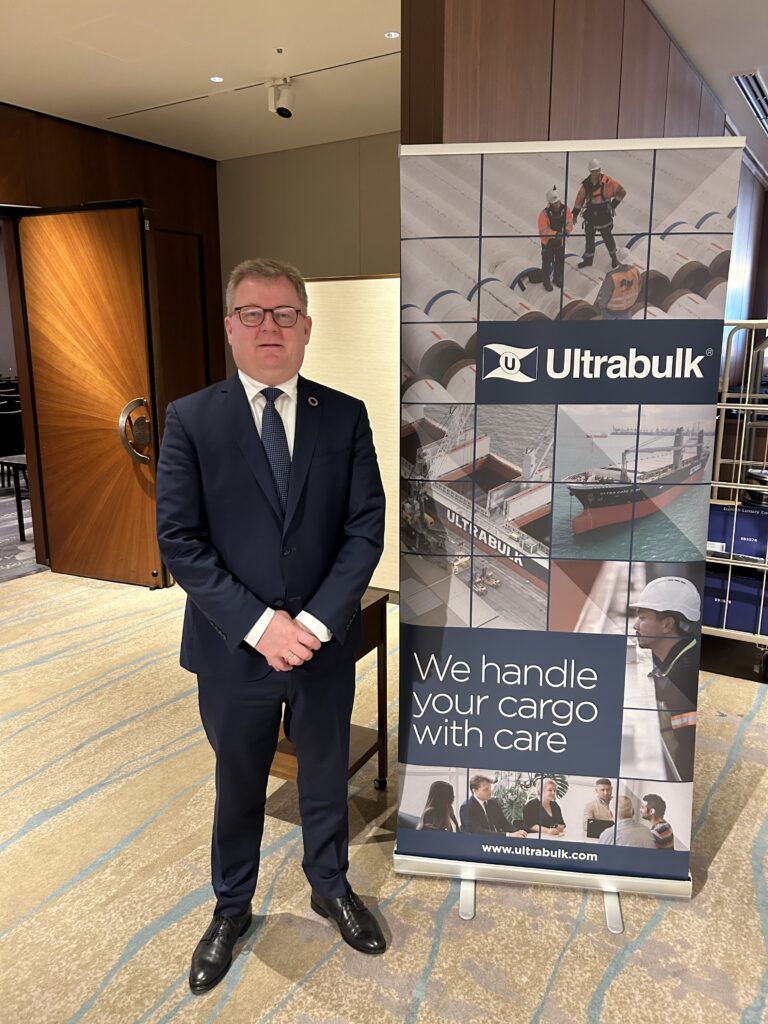
Based in Copenhagen, Ultrabulk is a leading player in the tramp shipping market. In March 2024, the company hosted a performance briefing in Tokyo, targeting Japanese shipowners, financial institutions, and trading companies. The briefing coincided with Olesen’s business trip to Japan, where he emphasized Ultrabulk’s commitment to transparency with its Japanese partners. “Every year, we provide our Japanese partners with an update on Ultrabulk’s progress over the previous twelve months,” Olesen stated. He also revealed that the technical specifications for the company’s new ammonia-fueled bulk carriers have been finalized, with ambitions to construct two to three vessels by 2027.(Text by Hirofumi Yamamoto)
―Could you elaborate on the specific purpose of your visit to Japan this time?
Olesen: “My visit aims to provide our Japanese partners with the latest updates from Ultrabulk. We want to explain our progress over the past year and ensure transparency. It’s particularly important to inform banks and financial institutions about our current situation and plans. We’re keen on discussing our market outlook and, crucially, our environmental initiatives. Additionally, we’re eager to promote the establishment of Ultrabulk’s new office in Japan,” Olesen responded.
―How is the progress on Ultrabulk’s zero-emission project involving ammonia-fueled bulk carriers?
Olesen: “We are slightly behind our initial schedule, but the preparation is nearly complete with the technical specifications now finalized. Our next step is to approach shipyards to discuss building plans, aiming for two to three vessels with a hopeful delivery by 2027. Whether this timeline is achievable will become clearer in the next few weeks as we finalize our amendments,” Olesen explained.
―Why is Ultrabulk particularly interested in ammonia-fueled ships?**
Olesen: “Our focus on ammonia is due to its status as a zero-emission fuel. While methanol does contain carbon dioxide, it’s important not to misunderstand; although we are concentrating on ammonia, we believe both methanol and ammonia will play roles. This is because we have a goal to achieve net zero by 2050, and it’s unlikely that we will rely solely on one type of fuel throughout this journey,” Olesen clarified.
―Ultrabulk operates a fleet of 170 to 200 vessels, ranging from Handysize to Kamsarmax bulk carriers and multipurpose ships. Can you provide details on the breakdown of chartered ships from Japanese shipowners?**
Olesen: “We currently have time charter contracts for 18 new buildings, including long-term charters for 15 new bulk carriers scheduled for completion between 2024 and 2026 with Japanese shipowners. This is a doubling from 8 new builds in the spring of 2023. The composition of the 15 ships chartered from Japanese shipowners includes 8 Handysize or smaller, 6 Supramax, 1 Kamsarmax,” Olesen detailed.
― This year marked the start of the EU Emissions Trading System (ETS) for the maritime sector. How has this impacted Ultrabulk?**
Olesen: “For us, the EU-ETS represents an operational cost. Consequently, we have included the costs associated with EU-ETS in our freight rates. The administrative burden of recording and reliably reporting allowances related to both shipowners and charterers has significantly increased. Our back-office management team is functioning well in handling this new task, which involves recording allowances related to both shipowners and charterers and ensuring their accurate submission,” Olesen explained.
―How did Ultrabulk perform financially in 2023?
Olesen: “In 2023, Ultrabulk’s performance saw a decrease with EBITDA (Earnings Before Interest, Taxes, Depreciation, and Amortization) falling 46% to $139.9 million, approximately 20.7 billion yen, and net profit dropping 69% to $53.34 million, about 7.9 billion yen. The decline in earnings can be attributed to the dry market downturn until last autumn, as well as a reduction in long-term charters, which diminished the tax benefits from tonnage tax schemes due to PO (purchase option) procurement.”
― What are your expectations for the maritime industry in Japan going forward?**
Olesen: “Our philosophy is that we admire Japanese shipowners and professionals, primarily due to the excellent quality of Japanese shipyards. We always prioritize coming to Japan first to discuss with Japanese shipbuilders and shipowners. Whenever possible, we aim to place new building orders with Japanese shipyards. If that’s not feasible, we look elsewhere, but Japan always remains our top choice,” Olesen expressed.
■Background on Hans Christian Olesen:
Hans Christian Olesen earned a degree in International Trade from Copenhagen Business School and joined the East Asiatic Company (EAC) in 1987. Following the acquisition of the business by the Tschudi Group in 1997, he moved to the company. After the merger of Tschudi Bulk and Ultrabulk in 2010, he served as the Global Head of the Panamax division from 2014, was the Chief Operating Officer in 2021, and has been the CEO since March 2022. He holds Danish nationality and is 55 years old.